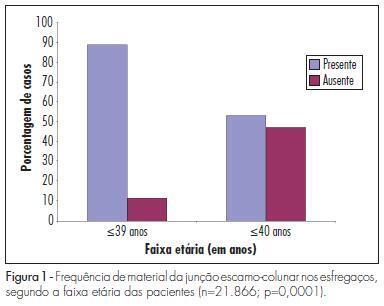Revista Brasileira de Ginecologia e Obstetrícia. 2011;33(3):128-132

PURPOSE: to evaluate the frequency of cells of the cervical transitional zone (CTZ) in cervicovaginal smears of women older than 40 years. METHODS: we conducted a retrospective study with review of 24,316 Pap smear reports during the period from January 2005 to December 2008, to evaluate the cases without material of the CTZ. Exclusion criteria were: total hysterectomy, smears with severe atrophy or unsatisfactory for analysis, cases without visualization of the cervix or the external orifice of the cervix closed during examination and records without the patient’s age. A total of 21,866 cervical-vaginal cytology reports were included in this study. We evaluated the relationship between the presence of material of the CTZ and use of hormone replacement therapy (HRT) in patients aged 40 years or more and the relationship between presence of material of the CTZ and a moderate to intense inflammatory process in patients aged 39 years or less. Data were analyzed statistically by the χ2 test and Odds Ratio. RESULTS: only 11.2% of patients younger than 40 years had no material from the CTZ in their smears, while 47% patients older than 40 years had no material from the CTZ (p=0.0001). Most patients aged 40 years or more (92.1%) did not use HRT and this was not a predictor of incidence of CTZ material in these patients (p> 0.05). In contrast, most patients younger than 40 years without CTZ material (74.5%) had abundant inflammation in the smears (p=0.0001). CONCLUSION: patients aged 40 years or more had a lower incidence of material from the CTZ in cervicovaginal smears, and inflammation was a factor that contributed to the absence of CTZ material in the smears from patients younger than 40 years.
Search
Search in:


Comments